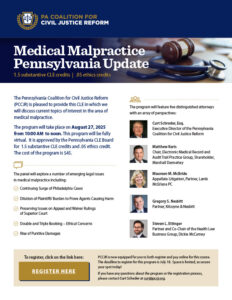The Pennsylvania Supreme Court issued a workers’ compensation decision in June of this year that has stunned businesses across Pennsylvania. The court’s decision in Protz v. WCAB (Derry Area School District) has stopped all Impairment Rating Evaluations (IREs), raises the question of whether claims closed as the result of an IRE can be re-opened, and likely will result in a mid-year premium increase for employers.
Section 306 (a.2) of the Workers Compensation Act allows an employer, once 104 weeks of total disability benefits have been paid, to request an Impairment Rating Evaluation (IRE) to determine the current degree of disability. An IRE rating above 50% constitutes total impairment while an IRE below 50% reduces the amount of time compensation is paid to 500 weeks. Employers can then file to change the employee’s disability from permanent to partial status. This same section of the act states that the degree of impairment shall be determined “pursuant to the most recent edition of the American Medical Association (AMA) Guides to the Evaluation of Permanent Impairment.”
The claimant in Protz argued that determining disability according to the “most recent” guidelines of the AMA, amounted to an unconstitutional delegation of authority by the legislature. The Fourth Edition of the Guide was in effect in 1996 when this provision was enacted into law. When the claimant was evaluated by the IRE physician, the Sixth Edition was the most recent edition and was used by the physician as the law required. The claimant argued that the law gave the American Medical Association, as opposed to the General Assembly, the authority to establish impairment criteria and thus was a delegation of legislative power in violation of Article II, Section I of the Pennsylvania Constitution.
On June 20, 2017, the Pennsylvania Supreme Court issued its opinion declaring Section 306 (a.2) an unconstitutional delegation of legislative activity. The impact has been immediate and swift.
Attorneys representing claimants argue that the Protz decision is retroactive to previous IRE determinations. They are actively seeking to re-open claims and re-establish benefits for their clients. Billboards in the Philadelphia region blare: “Did the Supreme Court just reinstate your workers’ compensation benefits?” Of course you can find out be calling the attorney who paid for the advertisement!
Employers might soon be paying additional premiums as a result of this decision. On August 15, the Pennsylvania Compensation Rating Bureau (PCRB) filed for an unprecedented mid-year loss cost increase of 6.06%! The PCRB did not mince words either. PCRB Circular No. 1686 states that this requested increase is “…in response to the Pennsylvania Supreme Court ruling in Protz v. WCAB (Derry Area School District).”
The legislature is taking notice. This morning, the House Labor and Industry Committee held a standing room only informational meeting on the impact of the Protz decision. Attorney Thomas Baumann, representing the claimant in Protz as well as the Association for Justice (aka Pennsylvania Trial Lawyers) argued against the entire concept of Impairment Rating Evaluations. He stressed that if the Commonwealth does adopt AMA impairment guidelines, a committee of “those answerable to the voters” should have authority and oversight over the guidelines. This would needlessly politicize the process, putting at risk the judgement of medical professionals in favor of political calculations.
House Labor and Industry Committee Chairman, Representative Rob Kauffman, just introduced H.B. 1840 that adopts the Sixth Edition of the American Medical Association “Guides to the Evaluation of Permanent Impairment. Senator Kim Ward has recently circulated a co-sponsor memo indicating her legislation will do the same thing. The Senator’s office states that the bill will be introduced shortly. With no reference to “most recent” editions, these legislative efforts should withstand constitutional scrutiny.
It is important that the General Assembly take up this issue quickly to avoid the impact of the interim loss cost increase proposed by the PCRB. PCRB President, William Taylor, said at the House meeting that if the legislature enacts a remedy in the near future, the PCRB will most likely withdraw the interim proposed loss cost increase.
Written by Curt Schroder, Executive Director of PCCJR, a coalition dedicated to bringing fairness to Pennsylvania’s courts by elevating awareness of civil justice issues and advocating for legal reform in the legislature More information at www.paforciviljusticereform.com



